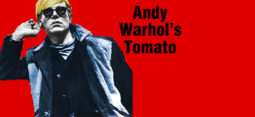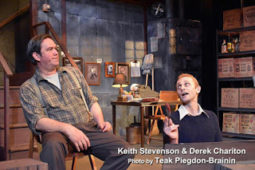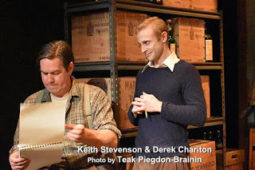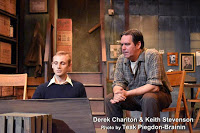Theater Review: Andy Warhol’s Tomato Is Art-Defining Art

September 3, 2019 Laura Foti Cohen Leave a comment
Note: Andy Warhol’s Tomato has been extended through October 27, 2019.
 The thrill of live theater is its immediacy. At a play—whether life-affirming or just plain awful—actor and audience share a never-to-be-repeated experience. When an actor cries onstage, it’s by definition in a single take. When a cell phone rings, movie actors don’t have to resist the urge to yell at the inconsiderate audience member. Stage actors do. (So do other audience members.)
The thrill of live theater is its immediacy. At a play—whether life-affirming or just plain awful—actor and audience share a never-to-be-repeated experience. When an actor cries onstage, it’s by definition in a single take. When a cell phone rings, movie actors don’t have to resist the urge to yell at the inconsiderate audience member. Stage actors do. (So do other audience members.)
We go to the theater for unique experiences and on rare occasions we’re rewarded with something transcendent. Something like Andy Warhol’s Tomato.
Pacific Resident Theatre opens its 35th season with this moving world premiere, by company member and Pittsburgh native Vince Melocchi. The playwright astutely presents the city where he grew up and two very different life paths: blue-collar rut and ambitious breakout. Workshopped and honed over the course of two years, the show is a tribute to the talent of the PRT company, and the commitment of the producer team of Sara Newman-Martins and PRT Artistic Director Marilyn Fox to spotlight high-quality new works.
 Andy Warhol (Derek Chariton) works on a sign for a bar owned by “Bones” Bonino (Keith Stevenson)
Andy Warhol (Derek Chariton) works on a sign for a bar owned by “Bones” Bonino (Keith Stevenson)
In a Pittsburgh bar circa 1946, owner “Bones” Bonino (Keith Stevenson) works the adding machine amidst cases of liquor and beer. Andy Warhola (Derek Chariton) is passed out in a corner; he’s had a panic attack. Bones is doing a favor for Andy’s brother, a fruit and vegetable vendor, by keeping an eye on him until he comes to.
Once he does, the two men begin to talk and find little in common. Delicate Andy is almost done in by the pressure to fill a sketchbook with drawings that will prevent him from being kicked out of Carnegie Tech. Bones, a no-nonsense working man, is initially unsympathetic. It’s only when the two discuss creating a sign for the bar that they start to dance around the subject of art and find a way toward something resembling mutual respect.
 As 18-year-old Andy, Chariton is remarkable. The pale and fragile teenager with the haunted mien displays flashes of confidence and humor that hint at the famed provocateur to come. Chariton subtly shapes his character, building from a likely loser with a far-fetched dream of success in New York to an artist inseparable from his art. Witty details and deft direction by Dana Jackson foreshadow and recast biographical tropes. Scenic designer Rich Rose does a masterful job of setting the stage to period perfection and includes a few witty details of his own.
As 18-year-old Andy, Chariton is remarkable. The pale and fragile teenager with the haunted mien displays flashes of confidence and humor that hint at the famed provocateur to come. Chariton subtly shapes his character, building from a likely loser with a far-fetched dream of success in New York to an artist inseparable from his art. Witty details and deft direction by Dana Jackson foreshadow and recast biographical tropes. Scenic designer Rich Rose does a masterful job of setting the stage to period perfection and includes a few witty details of his own.
Bones advises the aspiring artist to get a job in a restaurant when he gets to the big city so he doesn’t go hungry. In his world, risks don’t pay off; only a clear head and a good back-up plan guarantee survival. An eighth-grade dropout with a business to run, Bones nevertheless turns out to have a dream of his own. Stevenson slowly reveals the vulnerabilities behind the gruff exterior, creating a nuanced and multi-faceted man any of us would be fortunate to have on our side.
 Andy Warhol’s Tomato tells us—and shows us—that art is a living thing, always open to new interpretations. It asks big questions: Who decides what is art? What makes a man? How can we find common ground when the divide feels so wide? More importantly, it offers beautiful answers to those questions.
Andy Warhol’s Tomato tells us—and shows us—that art is a living thing, always open to new interpretations. It asks big questions: Who decides what is art? What makes a man? How can we find common ground when the divide feels so wide? More importantly, it offers beautiful answers to those questions.
This is art.
Andy Warhol’s Tomato plays Thursdays through Saturdays at 8:00 pm, matinees Sundays at 3:00 pm. Its run has been extended through Oct. 27. Pacific Resident Theatre is located at 703 Venice Blvd. in Venice. Tickets are $25-34 and can be purchased here. It’s the first play in a season that includes Arthur Miller’s All My Sons, opening September 14.
